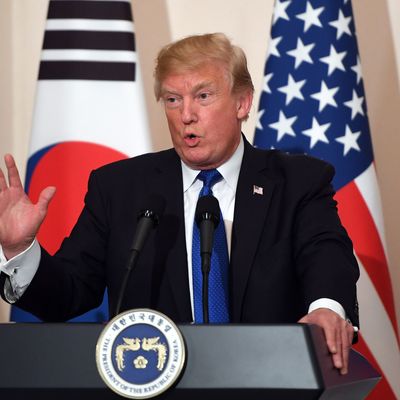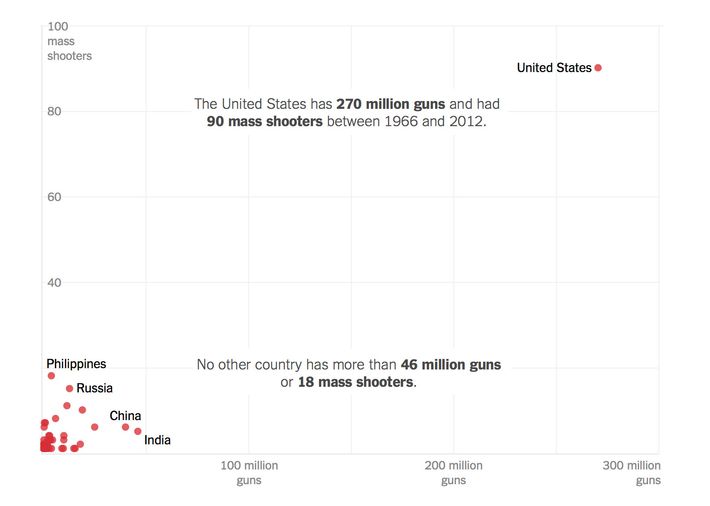
Republicans rarely offer an honest, internally consistent case for their opposition to gun control — because such a case is politically untenable. The rational argument for the GOP position is simple: Preventing gun violence just isn’t very important. Or, more specifically, reducing gun deaths is less important than maximizing the profits of weapons manufacturers, and the liberties of law-abiding gun collectors. This may be a bizarre view, but it is a coherent one. And, by all appearances, it is the Republican Party’s sincere conviction on the issue.
But it’s hard to tell the parents of Sandy Hook that routine mass murders are a worthy price for preserving the freedom of gun-range Rambos to purchase the assault weapons of their choice. And it’s even harder to argue, simultaneously, that the specter of mass murders is so unacceptable, it is worth banning immigrants from Muslim countries, keeping thousands of American troops in the Middle East, and spending hundreds of billions of dollars every year just to decrease the likelihood of such violence occurring on American soil.
Thus, Republicans (typically) refuse to acknowledge that there is any trade-off between lax gun laws and public safety. In fact, many have taken to arguing that the former actually enhances the latter. This was the line that President Trump took Tuesday, two days after a man armed with an AR-15 had killed 26 churchgoers in Texas. As Politico reports:
NBC’S ALI VITALI ASKS TRUMP IN SEOUL — VITALI: “Thank you, Mr. President. You’ve talked about wanting to put extreme vetting on people trying to come into the United States, but I wonder if you would consider extreme vetting for people trying to buy a gun.” TRUMP: “Trying to what?” VITALI: “Buy a gun.” TRUMP: “Well, you’re bringing up a situation that probably shouldn’t be discussed too much right now. We could let a little time go by, but it’s okay. If you feel that that’s an appropriate question, even though we’re in the heart of South Korea, I will certainly answer your question. “If you did what you’re suggesting, there would have been no difference three days ago, and you might not have had that very brave person who happened to have a gun or a rifle in his truck go out and shoot him, and hit him and neutralize him. And I can only say this: If he didn’t have a [gun], instead of having 26 dead, you would have had hundreds more dead. So that’s the way I feel about it. Not going to help.” [My emphasis.]
Here, Trump refers to Stephen Willeford, a man who exchanged fire with Devin Patrick Kelley at the church in Sutherland Springs, Texas, before chasing the killer away from the crime scene.
Trump’s argument, then, is that restricting access to firearms is counterproductive, because it might have prevented Willeford — and other good guys with guns in other situations — from being able to stop lawless killers.
This is not a rational argument against gun restrictions for several reasons. The most obvious is that, if maximizing the number of “good guys” with guns were an effective means of deterring gun crime, then you’d expect America to have one of the lowest rates of mass shootings and gun deaths in the developed world. After all, we don’t have many more criminals per capita than other advanced nations, but we do have way more guns per household. Thus, no developed country has more “good guys with guns” than we do — and none has as many mass shootings, either.

There are more mundane problems with Trump’s argument. Assault weapons allow “bad guys” to kill with great rapidity — by the time Willeford arrived at the church, Kelley had already shot everyone inside it, and was on his way out of the facility. It’s possible that Willeford prevented Kelley from taking his spree to a second location. But, regardless, the “good guy with a gun” model of public safety left a lot to be desired in Sutherland Springs.
Trump’s other arguments against gun control were similarly specious. The president cited the prevalence of gun violence in Chicago as evidence that gun control does not work. But most gang-related shootings in the Windy City are performed with guns purchased from neighboring (red) states with lax gun laws.
And, of course, Trump does not actually believe that it is inappropriate to call for policy changes in the immediate aftermath of an act of mass violence.
Islamist militants will never topple the U.S. government. ISIS isn’t a threat to our republic’s survival. It’s a threat to public safety, Americans’ sense of security, and our government’s capacity to credibly claim a monopoly on violence. President Trump believes that this threat is so unacceptable, we should bar as many Syrian refugees from entering our nation as is diplomatically tenable.
He also (ostensibly) believes that it is perfectly acceptable for the American government to disclaim any responsibility for preventing routine acts of mass slaughter at churches, concerts, elementary schools, and baseball fields — and to ask U.S. citizens to assure their own safety by becoming skilled marksmen and/or befriending well-armed vigilantes.
This may be a coherent policy for maximizing the financial security of weapons manufacturers, and the psychological security of Islamophobic survivalists. But as an approach to national security, it’s utterly insane.






























